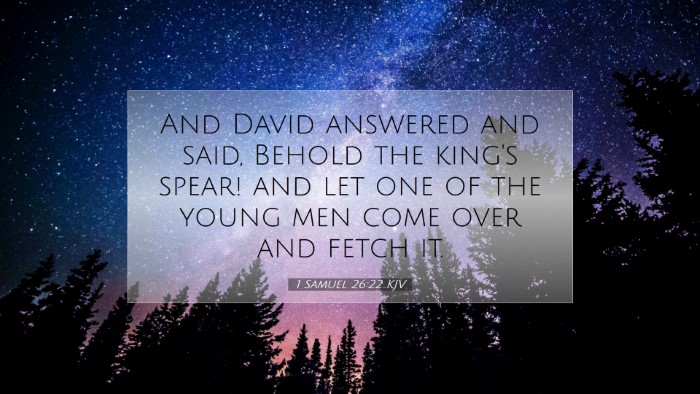Commentary on 1 Samuel 26:22
Verse Text: "And David answered and said, 'Here is the king's spear. Let one of the young men come over and get it.'"
Introduction
This verse is situated in a pivotal moment in David's life, illustrating the tension between David and King Saul. The context surrounding this verse reveals deep themes of providence, mercy, and divine authority versus human kingship.
Verse Analysis
David's response to Saul emphasizes his position and morality. He retrieves Saul’s spear, an act laden with meaning.
David's Answer
David's careful choice of words and actions reveals his integrity and respect for the office of the king, even when that king sought his life.
Matthew Henry notes that in this instance, David does not return sarcasm for Saul's pursuit, but rather demonstrates wisdom by offering the spear, a symbol of authority and power.
The Significance of the King's Spear
The spear represents more than just a weapon; it embodies Saul's authority and position as king. David, who had been anointed to replace Saul, refrains from seizing power through violent means.
Albert Barnes comments on this act as an assertion of David's moral high ground. By returning the weapon, he symbolically leaves Saul’s fate with the Lord.
Wisdom in Conduct
David's request for a young man to retrieve the spear demonstrates strategic thinking—showing deference and allowing the situation to play out without confrontation.
Adam Clarke amplifies this notion, illustrating that David acts not out of bitterness but out of a heart anchored in righteousness and respect for God’s chosen leader.
Theological Implications
This interaction surfaces profound theological themes of leadership, authority, and divine providence.
-
Authority and Respect: David's respect for Saul—even while the king seeks to kill him—encourages an understanding of authority that transcends personal grievances.
-
Mercy over Retribution: David's response embodies mercy; rather than retaliating, he points to the possibility of reconciliation, reminding us of God’s mercy offered to humanity.
-
Divine Sovereignty: The scenario underscores that God's plan is at work despite human actions. David understands that his rise will not be through force but through divine appointment.
Application for Pastors and Theologians
David’s handling of his adversary illustrates important lessons for church leaders today. In moments of trial, the call for integrity, respect for authority, and reliance on God's timing and wisdom is profound.
For Pastors: This passage invites reflection on how to navigate conflict with grace, seeking peace over strife, and trusting in God’s sovereignty.
For Theology Students: The interplay between David and Saul serves as a rich case study in the doctrine of providence, showing how God orchestrates events beyond human understanding.
Conclusion
1 Samuel 26:22 serves as both a narrative and a teaching moment. David’s actions reflect deep-seated convictions about leadership, morality, and faith in God’s overarching plan.
The commentary draws on the insights from Matthew Henry, Albert Barnes, and Adam Clarke to provide a multifaceted understanding of the text. As leaders, students, and scholars reflect on this passage, may they draw inspiration for their own paths in faith and ministry.


